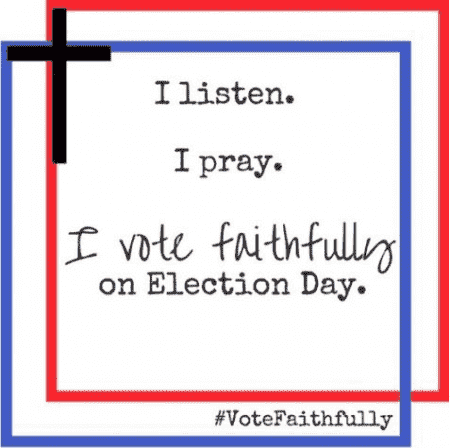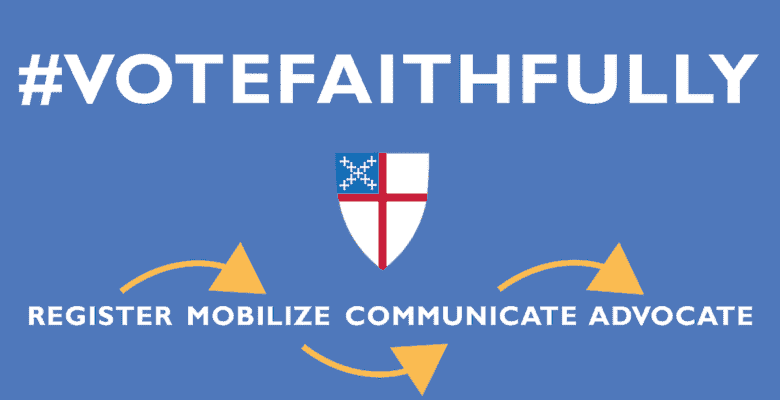“This election is a chance to exercise our right to vote, to participate in our common life, and to celebrate our ability to do so. In that joy, we should also look to this election, future elections, and time between elections to expand and defend the right to vote so that no one is excluded from this privilege.”
Below you will find tips and resources for engaging your family, friends, and church community after the election is over. Our goal is not to bring politics into church, but to remind us all that we are “to love one another as Christ loves us.” It is our hope that the resources below can help you speak and act as faithful witnesses of Christ Jesus, even in the most divisive of times.
Be Compassionate and Don’t Gloat
While divisiveness is growing, this does not have to be the trend of the future. Each and every one of us should be voting thoughtfully and prayerfully for candidates who represent our values and our communities, and who will make the best decisions for our communities, states and nation while in office. This is not a sporting event, and at the level of our families, friendships and church communities, this is not a competition. This is not an opportunity in face to face interactions OR through our phones and computers to bash others or gloat about victory, as we all will live with the results of this election.
This election is a chance to exercise our right to vote, to participate in our common life, and to celebrate our ability to do so. In that joy, we should also look to this election, future elections, and time between elections to expand and defend the right to vote so that no one is excluded from this privilege.
Remember Our Common Humanity
Democrats, Republicans, independents and those who align themselves with other political parties will be elected this Election Day. We will all live with those selections, and we all will need to work together to continue creating policies and legislation that will bring about justice, peace, health, and reconciliation. Recalling Presiding Bishop Curry’s Election Day message from 2016, we must make a conscious effort to reach out to others different from ourselves, and to be Americans, one nation under God, with liberty and justice for all.
Elections Have Consequences
This statement is true for this election, has been true for all previous elections, and will be true for future elections. No matter the results of November 6th, 2018, we should aim to employ our right to vote in all instances, giving careful consideration to the choices before us. In this, though, there may be people who express signs of grieving—especially those who may be more directly impacted by particular promises or anticipated legislative changes resulting from the election. Respond with that in mind, giving time and space for prayer and reflection following the election, but keeping the election in context of our broader work as peacemakers and followers of Jesus.
Keep the Election in Context
We cannot limit our vision for our country to one single election. We must remember that our participation in our common life does not stop on November 7th. The work continues through advocacy, building relationships with each other and with our elected officials of all political parties, and through engaging elections to come in 2020 and beyond. Don’t overlook the importance of this election, but remember that it is but one of many important steps on the road before us.
Use Civil Discourse, Conversation to Enhance Understanding
Civil Discourse is a tool critical to our conversations at home, in church, and in the halls of our government buildings. Civil discourse is not the only means of engaging political topics or expressing political will, but it is necessary if we are to seriously consider the challenges before us and craft the right solutions to move us forward. Policymaking is a messy task, and what is purely moral is not always clear. Check out our Civil Discourse Curriculum, a 5-part series, for help learning how to talk with one another across political disagreement. It is important that we listen, practice the tenets of civil discourse, and engage our call to “speak out for those who cannot speak, to defend the rights of the poor and the needy.”

In collaboration with the Evangelical Lutheran Church in America and the United Church of Christ, the Episcopal Church has created a #votefaithfully toolkit on churches and voting, including “what not to do” in English and in Spanish.
The Episcopal Church Office of Government Relations represents the policy positions of the Episcopal Church to the U.S. federal government, highlighting the resources and experience of the Church and the Anglican Communion. The Episcopal Public Policy Network is a grassroots network dedicated to carrying out the Baptismal Covenant call to ‘strive for justice and peace’ through the active ministry of public policy advocacy. If you are looking for additional resources for talking through differences, please check out the free Civil Discourse curriculum.


I appreciate the reminder to be kind and considerate in what I say, especially on social media, about people and candidates who differ from my choices. I tend to respond by insulting the opposite’s intelligence. As a retired editor, I feel compelled to remind you to update the Election Day and year in your above comments.
A good way to invite us all into civil discourse. Since accuracy in reporting is a hallmark of good discourse, I would note: “We must remember that our participation in our common life does not stop on November 3rd” rather than the 7th as you suggest.